Families Impacted by Incarceration: Resources for Changing Policies and Practices
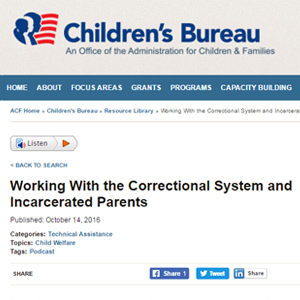
Working with the Correctional System and Incarcerated Parents [Podcast],
This podcast for child welfare staff provides practical information on how to navigate the protocols and procedures of state correctional visits to support contact between incarcerated parents and their children.
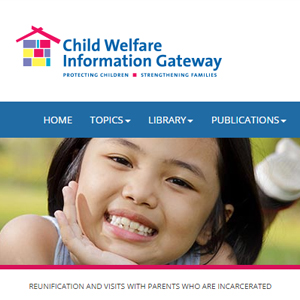
Reunification and Visits with Parents Who are Incarcerated,
This page provides links to a range of resources for child welfare professionals who are supporting the reunification of a child with a parent who is about to be released from a correctional system.
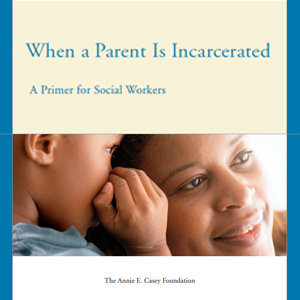
When a Parent Is Incarcerated – a Primer for Social Workers [PDF],
This document describes the reality of having a parent who is in state, federal prison or jail. While the emphasis is prevention, the rights of both incarcerated parents and their children are explained. Useful not only for social workers, but for anyone and everyone who needs facts about the legal issues surrounding incarceration and parenting.
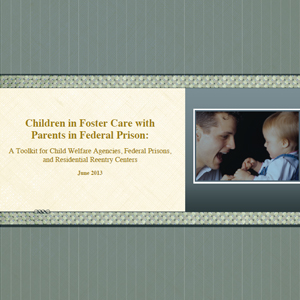
Children in Foster Care with Parents in Federal Prison [PDF],
Provides answers to frequently asked questions regarding helping children to reunite with their incarcerated parents. Timelines are provided, along with resources and tools to help social workers, parents and children to lessen the impact of incarceration on familial relationships.
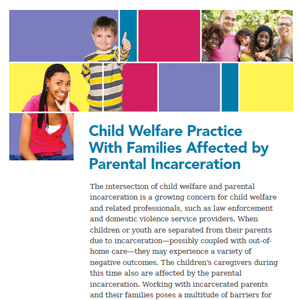
Child Welfare Practice with Families Affected by Parental Incarceration [PDF],
Data related to prison/jail times explained, along with information regarding how parental incarceration affects a child both emotionally and physically. The Adoption and Safe Families Act (ASFA) and how it impacts incarcerated families is discussed. Information is user-friendly. Provides guidance for everyone involved, from social workers, to parents, to children.
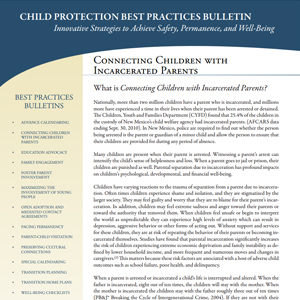
Connecting Children with Incarcerated Parents [PDF],
A brief but informative review of how parental incarceration affects children, best practices to support these children and youth, and the advantages of keeping the familial connection between an incarcerated parent and their children. It describes the roles those in the justice system (judge, attorney, law enforcement officer), human services system (social worker, volunteer, foster parent), biological parents or the affected minor can play in keeping connections strong.
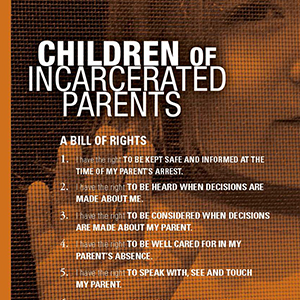
Bill of Rights for Children of Incarcerated Parents [PDF],
This document describes a set of rights regarding children of incarcerated parents, as well as an agenda for action for these minors. There is a description of the realities of how incarceration of parents affects children, as well as individual information about each right, how it applies, and individual stories of children affected by their parent’s imprisonment.
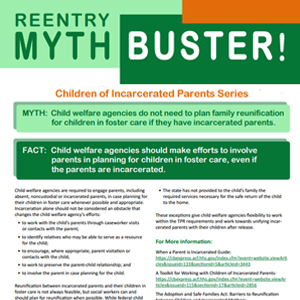
Children of Incarcerated Parents Myth Busters [PDF],
This series addresses common myths which prevent families impacted by incarceration from getting the help and support they need. Issues covered include: eligibility for Medicaid; Social Security benefits; TANF (Temporary Assistance for Needy Families); SNAP (Supplemental Nutrition Assistance Program, commonly known as “food stamps”); and placement of children in the case of parental incarceration. Each myth buster provides useful web-based resources for those in need of further information.
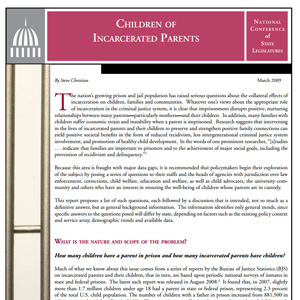
Children of Incarcerated Parents [PDF],
This report discusses how parental incarceration affects children including: data and descriptions of the nature and scope of the problem; policy options for lawmakers and improving collaboration between the different systems involved: justice, human services and education.
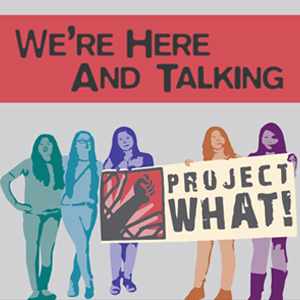
We're Here And Talking: Project WHAT! Policy Report [PDF],
We’re Here And Talking is a research report developed by children of incarcerated parents as youth advocates. The project discusses four distinct challenges: (1) maintaining family unity, (2) access to visitation, (3) barriers to re-entry, and (4) unmet emotional needs. Each of these challenges is discussed in depth, including findings, data and recommendations.
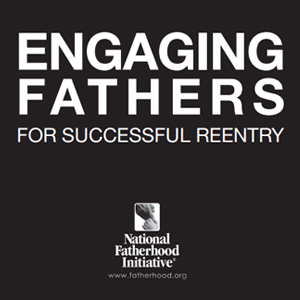
Engaging Fathers for Successful Re-entry [PDF],
This guide provides data on common challenges facing fathers on re-entry including: housing, employment, marriage and relationships, substance abuse, mentoring and community support, child support, involving moms, and domestic violence. Each section provides concrete practice tips for programs doing work in this area.
